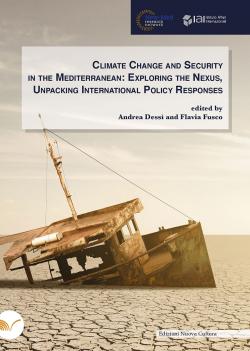Climate Change and Security in the Mediterranean: Exploring the Nexus, Unpacking International Policy Responses
This volume examines the multidimensional relationship between climate change and security across Mediterranean Basin states and societies, underscoring the key social, political and economic challenges of the present climate emergency and outlining possible cooperative avenues to mitigate its most adverse effects. Part of a broader research and engagement agenda on climate and the environment undertaken by the New-Med Research Network since 2020, individual chapters, written by leading scientists, academics and policy researchers, tackle different dimensions of the climate change-security nexus in the Mediterranean, assessing its implications on state and societal resilience, the future of living ecosystems and the stability of social contracts as well as the urgent need to strengthen genuine intra-Mediterranean collaboration to face the climate emergency and promote an equitable sharing of the risks and burdens associated with the green energy transition.
-
Details
Rome, Nuova Cultura, May 2022, 146 p. : ill. -
Issue
9 -
ISBN/ISSN/DOI:
978-88-3365-458-4
Contributors, p. 7-9
List of abbreviations, p. 11-12
Foreword, by Lorenzo Kamel, p. 13-14
Introduction: Framing the Climate Emergency in the Mediterranean, by Andrea Dessì and Flavia Fusco, p. 15-34
The Mediterranean hotspot
Division of the volume
References
1. Climate Security in the Mediterranean: What Prospects for Regional Cooperation?, by Niklas Bremberg, p. 35-58
1.1 International cooperation on climate security: An overview
1.2 Climate-related security risks in the Mediterranean region
1.3 Recent regional climate actions in the Mediterranean
1.4 Prospects for regional cooperation on climate security
References
2. The Mediterranean as a Climate Change Hotspot: Implications for State and Societal Resilience, by Wolfgang Cramer and Joël Guiot, p. 59-79
2.1 Climate-related drivers of risk
2.2 Non-climatic drivers of risk
2.3 Risks for water resources and food supply
2.4 Risks for marine and terrestrial ecosystems
2.5 Risks for human livelihoods
2.6 Increasing economic resilience through mitigation and adaptation
2.7 The Mediterranean potential for sustainability transformation
2.8 Equity, climate justice and human rights
References
3. Drought, Desertification and Displacement: Re-Politicising the Climate-Conflict Nexus in the Sahel, by Luca Raineri, p. 81-110
3.1 The Sahel, a key test for the climate-conflict nexus hypothesis
3.2 Exploring the nexus across time
3.3 Droughts, famines and rebellions
3.4 Desertification, regreening and competition for land use
3.5 Re-politicising the climate-conflict nexus
3.6 Recommendations
References
4. Renewable Energy in the Mediterranean: Pathways for Multilateral Cooperation, by Silvia Pariente-David and Philippe Drobinski, p. 111-146
4.1 The policy context
4.2 The Mediterranean wealth: Plentiful carbonless energy resources
4.3 Mediterranean energy market integration
4.4 Pathways for multilateral cooperation
References



